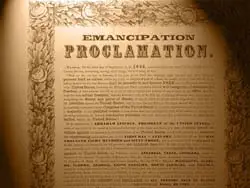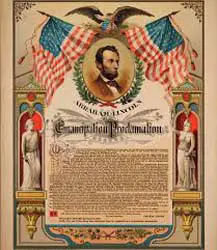Emancipation Proclamation
When the Civil War in America broke out President Lincoln focused on support of the war based on the fact of preserving the Union instead of getting rid of slavery. President Lincoln knew that slavery was very wrong, but also understood that there was little in the way of argument against slavery in the north.


It’s important to know that the support of the northerners in the Civil War was a major concern to winning. Creating a situation where the slavery of the south would be freed, would not be very popular. By the middle of 1862, when thousands of slaves were fleeing to the north to join the Union Army, Lincoln became convinced that if he planned it right, abolishing slavery would be a good military strategy.

President Lincoln came to the conclusion that he wanted to create a law using his Executive Power to override any existing laws. He brought the idea to his cabinet and told them he would take suggestions, but that his mind was made up. He did accept one suggestion, which was that it would be well-received if they were close to victory against the south and the southerners would not be able to fight it.


On September 22, 1862, after the Antietam victory, President Lincoln issued a preliminary copy of the Emancipation Proclamation, indicating that it would be in effect January 1, 1863. It related to all slaves in the rebellious states “shall be then, thenceforward, and forever free”. It was an important time in the war as it turned the fight around from preserving the nation to a fight for human freedom.

The Emancipation Proclamation was an excellent political move on the part of President Lincoln as it achieved one of the goals that he wanted, which was to get rid of slavery, and it also put those that might be against the freedom in a particular position where they couldn’t voice their opinions, as the President position his cause based on the fact that southern slaves themselves were a contributing factor to help the south fight the war.

The move to create the Emancipation Proclamation allowed the freedom of 3.1 million of the then 4 million slaves in the country. The only states that didn’t have to obey the proclamation were those states that were on the border of the Union states and didn’t have slaves that were contributing to the southern war effort. Lincoln himself tried to convince these states to free their slaves, even with promises of payment from the federal government.

During the next 2 ½ years, 180,000 former slaves fought in the Union Army as free men, 10,000 served in the Navy. The Emancipation Proclamation contributed to the war effort and changed the tide. Lincoln later referred to it in his Gettysburg Address as “a new birth of freedom”.
The freeing of the slaves eventually destroyed most of the south, as they depended on slaves for every living and business function. It reduced their forces in such amounts and sent them north, thereby helping to win the Civil War by the Northern Union armies.




